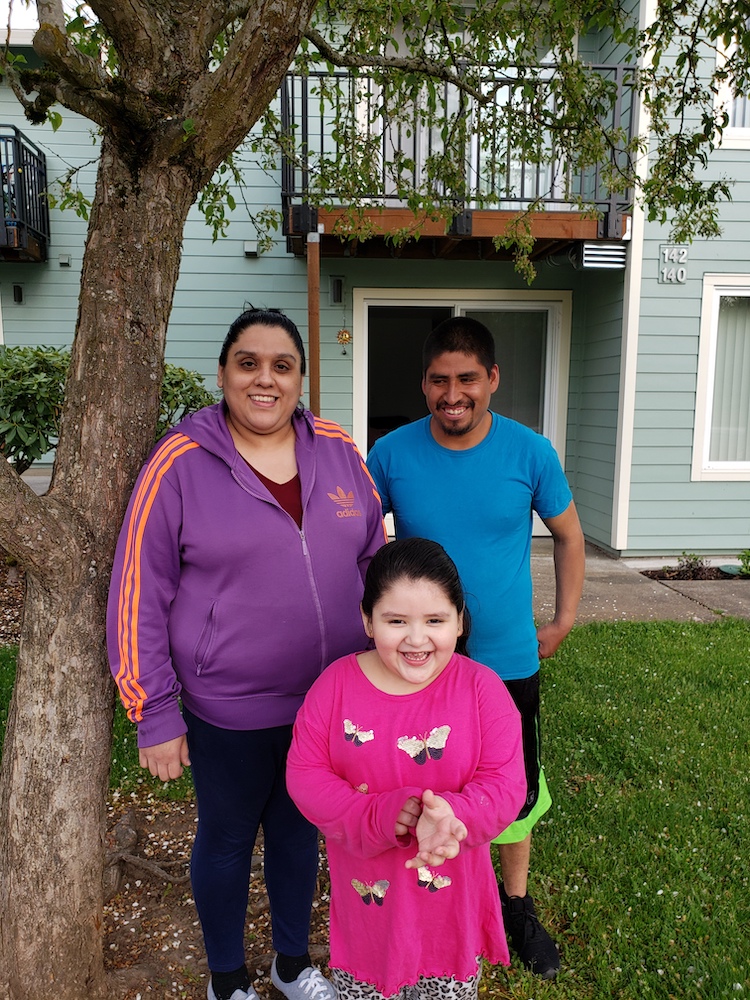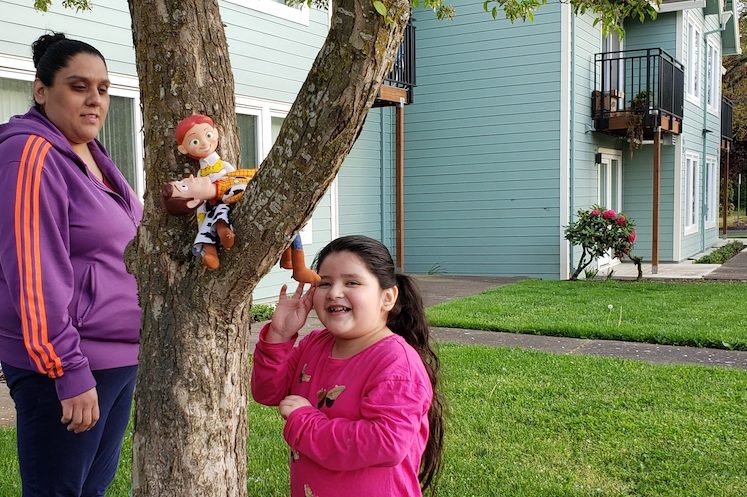 Juanita and her family live in Woodburn with a small, tight-knit community of farmworker families who are essential frontline workers. They are currently without a vehicle and work has been cut back significantly since the outbreak of COVID-19. This has made it difficult to get food and other basic needs met, but Juanita and her family remain hopeful and grateful for the work and support they do have. FHDC’s resident services coordinator, Anabel Hernandez-Mejia, recently caught up with Juanita while her 4-year-old daughter, Sammy, played with nearly every outdoor toy she has—bike, scooter, bouncy ball, volleyball, and of course, her dolls.
Juanita and her family live in Woodburn with a small, tight-knit community of farmworker families who are essential frontline workers. They are currently without a vehicle and work has been cut back significantly since the outbreak of COVID-19. This has made it difficult to get food and other basic needs met, but Juanita and her family remain hopeful and grateful for the work and support they do have. FHDC’s resident services coordinator, Anabel Hernandez-Mejia, recently caught up with Juanita while her 4-year-old daughter, Sammy, played with nearly every outdoor toy she has—bike, scooter, bouncy ball, volleyball, and of course, her dolls.
Anabel: How has COVID-19 affected your life? What have you learned about yourself, your community during this?
Juanita: COVID-19 has affected us with being able to buy groceries, pay rent, find, and go to work. Our 4 yr old has a lot of energy and the usual play areas we release that energy with are closed.
Anabel: Are you working and if so, how is your employer responding to the pandemic?
Juanita: Yes, I have some work putting up ropes for hops at a local farm. There is a real fear at work about getting sick and bringing home the virus to our families and communities. Workers are wearing masks, and I’m grateful to have a chance to work.
Anabel: What are your hopes for the future?
Juanita: To be able to get together, go outside more often, and to find more work.
Anabel: How are your kids doing? Are they still learning?
Juanita: I’m hoping to enroll Sammy in preschool when it’s possible. There currently isn’t enough space to play and the libraries aren’t open, which is challenging. We are grateful for what we do have.
Anabel: How has living at FHDC been supportive? How can we be more supportive?
Juanita: It has been nice to receive regular bread donations and that resident services staff are contacting our families to support us and giving us the confidence to share any information that may be troubling us. One area that would be nice to have are laundry facilities inside our apartments– the shared facilities are a bit challenging to keep physical distance and follow the rules.
Anabel: How has physical distancing impacted your/your family’s life? Social life?
Juanita: Our family [that is closest in proximity] lives in Salem and since the physical distance requirement, we check-in on each other regularly via phone. This is family that we used to not have much contact with, and so this situation has brought us closer together.
Anabel: What do you/your family need right now?
Juanita: Comida=food.
Anabel: How can communities support each other right now?
Juanita: Pitch in and help one another. Example is my friend through Facebook found a food box and brought it to us since we do not have a vehicle for transportation. Everyone is doing what they can to “Echarle la mano” – lend a hand.
To support families in need like Juanita’s, FHDC is launching our family livability fund to support residents with food, rent, resources, and support. You can make a contribution here

